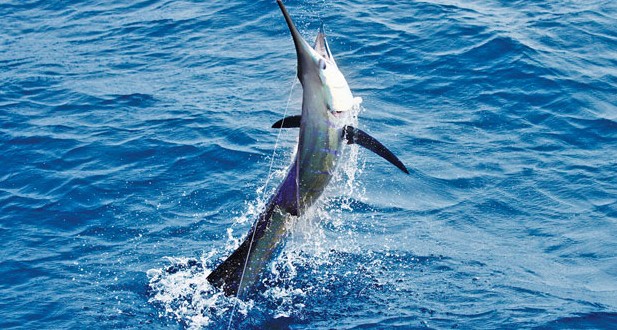Caribbean sport fishermen are truly some of the best. Nowhere was this more evident than at the Offshore World Championship (OWC), the largest offshore fishing tournament in the world. Six teams, who first had to win one of the 17 qualifying competitions held in the Caribbean, entered this April 12 to 17 event held out of Quepos, Costa Rica. The Caribbean teams, up against 67 others who had won tournaments in countries such as Angola, Australia, Brazil, Croatia, Fiji, Kenya, Mexico, Peru, Spain and the USA, made history by setting a world record of 2,840 billfish releases in a tournament. What’s more, the Trinidad & Tobago team of Dominic Philip Wallace, Jonathan De la Rosa, Albert Battoo, Ronald Wortman and Capt. Ali Travis, who gained entry to the OWC by winning the 2014 Martinique International Billfish Tournament, finished 7th and were the top Caribbean team with 60 sailfish releases in four days of fishing.
“Hard work, dedication and years of experience in various types of fishing was the secret to our success,” says Ali. “Plus, some of our crew members have fished this tournament in the past.”
The other Caribbean teams also had past experience either having fished the OWC in the past or by having team members familiar with Costa Rica’s waters.
“I fished this tournament in 2003 when I last qualified,” says James Peirce, whose team of Anthony Kent, Chad Moss, David Stoute and Adam Godson finished 15th overall with 50 sailfish and one blue marlin, and represented as winners of their home island’s Barbados International Fishing Tournament. “This helped as I knew what to expect from a logistics point of view but back then the tournament was in Cabo San Lucas.”
AK Lovarco, one of the team of St. Croix and St. Martin anglers who earned entry via the St. Martin Billfish Tournament, had fished off Costa Rica twice on charter the month before the OWC and brought local knowledge to his team’s efforts.
“This was critical to the success we had,” says Lovarco’s fellow angler David Johnson, whose team of Austin Schneider, Chad Sheraw and Lovarco, from St. Croix, and Phillip Barrett from St. Martin finished 46th with 35 sailfish releases.
Quepos, Costa Rica and Port of Spain, Trinidad, are both located around 10 degrees north latitude. Yet anglers found that billfishing in the Pacific Ocean was a lot different than in the Caribbean Sea.
“Fishing was very different from what we do in the Southern Caribbean, so it took some getting used to,” says Alan Sheppard, who, with his Trinidadian team of Gordon Dalgliesh, Grant Millar, Adam Conyers, Jerome Rostant, Timothy Burns and Andrew Sa Gomes placed 49th after earning entry by winning the Budget Marine Spice Island Billfish Tournament in Grenada. “For one thing, the seas were a lot calmer than we are accustomed to. It is also very hot as there is not much breeze offshore at all. The fishing method was also different.”
For some there was a big learning curve to get the hang of using naked ballyhoo with non-offset circle hooks and dropping back to feed the sailfish.
“The format is difficult and very much an angler’s event because of the skill required to hook and release billfish,” explains tournament director Dan Jacobs. “Teams also have to rotate to four different charter boats during the competition and react to the changing crews and boat amenities. This is a marathon event designed to create a level playing field with the best anglers and teams always rising to the top.”
Another difference for the Caribbean anglers was the sheer number of sailfish in the Pacific.
“In a week here an angler could realistically expect to catch and release more sailfish than in a lifetime in the Southern Caribbean,” says Barbados’ Peirce. “We catch many of the same species in the Caribbean, but sadly we catch very few due to many years of commercial overharvesting from local and international fishers. With some luck Caribbean governments will see the success of countries like Costa Rica in converting the ocean resource into a sustainable source of renewable high value foreign exchange income as opposed to non-renewable commercial harvest of billfish for pennies per pound.”
In the end, the OWC’s shoreside festivities such as nightly dock parties, tandem events like a roosterfish tournament for non-fishing spouses and guests, and grand awards dinner, proved just as enjoyable as the seaside fisheries for the Caribbean teams.
“It was a lot of fun to meet the crews from all the different countries,” says St. Croix’s Johnson. “There were many legendary anglers and teams there and it was an honor to be among them.”
Read full post: http://www.allatsea.net/six-caribbean-fishing-teams-compete-in-offshore-world-championship/
